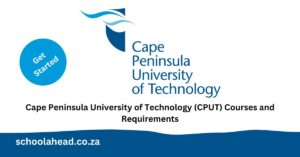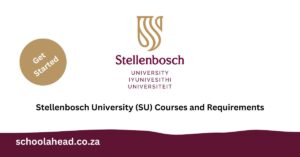Durban University of Technology (DUT) is a leading university of technology located in the KwaZulu-Natal province of South Africa. It offers a wide range of undergraduate and postgraduate courses across various faculties. In this article, we will provide you with information on the DUT courses and their admission requirements.
Faculties and Courses Offered
DUT has six faculties, each offering a variety of courses.
- Faculty of Accounting and Informatics:
This faculty offers courses in accounting and finance, as well as information technology.
Courses offered:
- National Diploma in Accounting
- Bachelor of Technology in Cost and Management Accounting
- Bachelor of Technology in Accounting
- Faculty of Applied Sciences:
This faculty offers courses in various scientific fields, including chemistry, biomedical technology, and horticulture.
Courses offered:
- National Diploma in Analytical Chemistry
- National Diploma in Biomedical Technology
- National Diploma in Horticulture
- National Diploma in Medical Orthotics and Prosthetics
- Bachelor of Technology in Biotechnology
- Bachelor of Technology in Medical Laboratory Sciences
- Bachelor of Technology in Chiropractic
- Bachelor of Technology in Radiography
- Faculty of Arts and Design:
This faculty offers courses in the creative arts, such as architecture, graphic design, and fashion design.
Courses offered:
- National Diploma in Architectural Technology
- National Diploma in Clothing and Textile Technology
- National Diploma in Graphic Design
- Bachelor of Technology in Fashion Design
- Bachelor of Technology in Graphic Design
- Bachelor of Technology in Interior Design
- Bachelor of Technology in Jewelry Design and Manufacture
- Bachelor of Technology in Video Technology
- Faculty of Engineering and the Built Environment:
This faculty offers courses in engineering, construction management, and town planning.
Courses offered:
- National Diploma in Chemical Engineering
- National Diploma in Civil Engineering
- National Diploma in Construction Management
- National Diploma in Electrical Engineering
- National Diploma in Mechanical Engineering
- National Diploma in Quantity Surveying
- National Diploma in Town and Regional Planning
- Bachelor of Technology in Chemical Engineering
- Bachelor of Technology in Civil Engineering
- Bachelor of Technology in Construction Management
- Bachelor of Technology in Electrical Engineering
- Bachelor of Technology in Mechanical Engineering
- Bachelor of Technology in Quantity Surveying
- Bachelor of Technology in Town and Regional Planning
- Faculty of Health Sciences:
This faculty offers courses in health-related fields, including dental technology, emergency medical care, and somatology.
Courses offered:
- National Diploma in Dental Technology
- National Diploma in Emergency Medical Care
- National Diploma in Environmental Health
- National Diploma in Somatology
- Bachelor of Technology in Dental Technology
- Bachelor of Technology in Emergency Medical Care
- Bachelor of Technology in Environmental Health
- Bachelor of Technology in Homoeopathy
- Bachelor of Technology in Somatology
- Faculty of Management Sciences:
This faculty offers courses in business management and administration, hospitality management, marketing, and public management.
Courses offered:
- National Diploma in Hospitality Management
- National Diploma in Human Resources Management
- National Diploma in Marketing
- National Diploma in Public Management
- Bachelor of Technology in Business Administration
- Bachelor of Technology in Hospitality Management
- Bachelor of Technology in Human Resources Management
- Bachelor of Technology in Marketing
- Bachelor of Technology in Operations Management
- Bachelor of Technology in Public Management
See also: DUT Online Application (Durban University of Technology)
Admission Requirements
The admission requirements for Durban University of Technology (DUT) vary depending on the level of the course and the faculty offering the course. Here are the general admission requirements for undergraduate courses:
- National Senior Certificate (NSC) with diploma endorsement:
- Minimum of 30% in the language of learning and teaching (LOLT) of the institution.
- Minimum of 50% in four recognised 20-credit NSC subjects.
- Applicants for engineering programmes must have a minimum of 60% for mathematics and physical sciences.
- National Certificate Vocational (NCV):
- NQF level 4.
- Applicants for engineering programmes must have a minimum of 50% for mathematics and physical sciences.
- Mature Age Exemption:
- Candidates who do not meet the minimum entry requirements may be considered for admission if they are 23 years or older on or before the first day of registration for the academic year.
- Such applicants must submit a letter of motivation and a curriculum vitae (CV) detailing their work experience and any relevant qualifications.
- Applicants may also be required to write an access assessment test or attend an interview.
- Recognition of Prior Learning (RPL):
- Applicants who do not meet the minimum entry requirements may apply for admission based on Recognition of Prior Learning (RPL).
- RPL is a process that assesses an applicant’s prior learning and work experience and determines whether this is equivalent to the required academic qualifications.
- Applicants must submit an RPL application form and provide evidence of their prior learning and work experience.
Note: The above requirements are general guidelines, and specific faculties may have additional admission requirements. It is essential to check the admission requirements for the specific course and faculty you are interested in before applying.



